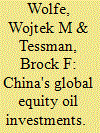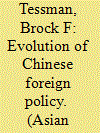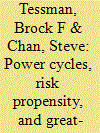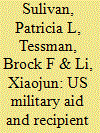|
|
|
Sort Order |
|
|
|
Items / Page
|
|
|
|
|
|
|
| Srl | Item |
| 1 |
ID:
112632


|
|
|
|
|
| Publication |
2012.
|
| Summary/Abstract |
In this article, we construct and analyze an original database of overseas Chinese equity oil investments (EOI) in order to assess the relative importance of economic and geopolitical factors in determining the type of countries that are most likely to receive those investments. We find that China's national oil companies (NOCs) choose to make considerable investments in certain oil rich countries while ignoring others. We develop and examine 'economic opportunity' and 'geopolitical relevance' explanations of Chinese EOI. The economic explanation assumes that Chinese oil companies operate autonomously despite the fact that they are state owned, and that they seek international experience in countries offering less competition but more risk. The geopolitical explanation suggests that Chinese equity oil investments are developed and coordinated by the central government as part of a geopolitical strategy that is designed to bypass the so-called 'Malacca Dilemma' and deepen security ties with oil-rich states through the conduct of oil diplomacy. We argue that Chinese EOI tends to reflect both corporate interests and government priorities, and that it generates more liabilities rather than benefits for China.
|
|
|
|
|
|
|
|
|
|
|
|
|
|
|
|
| 2 |
ID:
091585


|
|
|
|
|
| Publication |
2009.
|
| Summary/Abstract |
Rising powers such as the People's Republic of China (PRC) experience two distinct stages of relative capability growth. China is currently in the first stage of growth, which is defined by increasingly rapid expansion and incentives for foreign policy accommodation. As the PRC shifts to the second stage, however, relative growth will slow, and leaders in Beijing will be presented with new incentives for foreign policy confrontation. This article formalizes a two-stage model of relative power growth and argues that China's shift to the second stage of growth will threaten regional and global stability. During this shift, the key to international security will be a coordinated, multilateral effort that responsibly balances China's growing power with a similarly expanded international role for China.
|
|
|
|
|
|
|
|
|
|
|
|
|
|
|
|
| 3 |
ID:
052173


|
|
|
|
|
| Publication |
April 2004.
|
| Summary/Abstract |
The theory of power cycles contends that the growth and decline of national power holds the key to understanding the occurrence of extensive wars. Certain critical points in a state's power trajectory are especially dangerous occasions for such armed clashes. The power cycles of nine major states during the period from 1816 to 1995 are examined, and prospect theory is used to derive expectations about the risk propensity of states during different periods in their power cycle. These expectations are in turn applied to an analysis of deterrence encounters among the major states. Results show that critical points tend to incline states to initiate deterrence confrontations and escalate them to war. Democratic states, however, are less susceptible to these tendencies than authoritarian ones. Results also show that changes in power trajectories do affect the occurrence and outcome of deterrence encounters among the great powers.
|
|
|
|
|
|
|
|
|
|
|
|
|
|
|
|
| 4 |
ID:
113333


|
|
|
|
|
| Publication |
2012.
|
| Summary/Abstract |
This paper presents "strategic hedging" as a way to conceptualize much of the strategic behavior currently employed by second-tier states like China, Russia, Brazil, and France. Hedging is an alternative to strategies like balancing, bandwagoning, and buck-passing. Like those other strategies, hedging is driven by structural incentives associated with the current polarity of the international system and power concentration trends within it. Hedging will be most prevalent in international systems that are defined by a leading state that, while in a position of power preponderance, is also in the process of relative decline. Strategic hedging behavior is effective for second-tier states in such deconcentrating unipolar systems because it avoids outright confrontation with the system leader in the short term, while still increasing the hedging state's ability to survive such a direct military confrontation should it occur in the long run. Strategic hedging behavior can also be used to insure the hedging state against security threats that might result from the loss of public goods or subsidies that are currently being provided by the system leader. In this article, I define strategic hedging behavior, present a mechanism for identifying empirical evidence of strategic hedging, and apply that mechanism to three case studies: the Sino-Russian strategic partnership, Brazil's approach to regional leadership, and French opposition to the 2003 us invasion of Iraq.
|
|
|
|
|
|
|
|
|
|
|
|
|
|
|
|
| 5 |
ID:
106271


|
|
|
|
|
| Publication |
2011.
|
| Summary/Abstract |
What can states expect to receive in return for the military aid they provide to other states? Can military aid buy recipient state compliance with donor objectives? In this study, we systematically investigate the effects of US military assistance on recipient state behavior toward the United States. We build on existing literature by creating three explicit theoretical models, employing a new measure of cooperation generated from events data, and controlling for preference similarity, so that our results capture the influence military aid has on recipient state behavior independent of any dyadic predisposition toward cooperation or conflict. We test seven hypotheses using a combination of simultaneous equation, cross-sectional time series, and Heckman selection models. We find that, with limited exceptions, increasing levels of US military aid significantly reduce cooperative foreign policy behavior with the United States. US reaction to recipient state behavior is also counterintuitive; instead of using a carrot-and-stick approach to military aid allocations, our results show that recipient state cooperation is likely to lead to subsequent reductions in US military assistance.
|
|
|
|
|
|
|
|
|
|
|
|
|
|
|
|
|
|
|
|
|